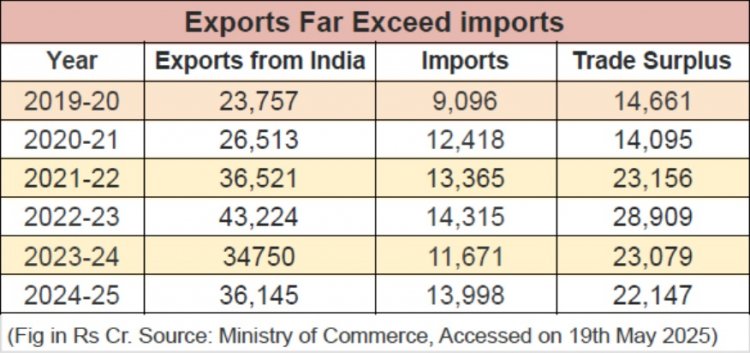The Indian agrochemical industry is sounding the alarm over a sharp surge in imports, particularly from China, which stakeholders claim is threatening the viability of domestic manufacturers. The Crop Care Federation of India (CCFI), the apex body representing over 50 leading Indian agrochemical manufacturers, has given several representations to the government in this regard. The association has once again reiterated its appeal to the Finance Ministry. In a letter to the ministry, it has asked to increase customs duties on imported agrochemical formulations and technical-grade pesticides, in order to create a level playing field for domestic producers.
Trade Surplus But Industry Under Pressure
India’s agrochemical sector has been designated a “Champion Sector” due to its export strength and growing self-reliance. In FY 2024-25, the industry recorded a trade surplus of Rs 22,147 crore, largely driven by the export of generic agrochemicals, which dominate 93% of the global market.

Despite this positive export performance, the domestic industry is reeling under the pressure of cheap imports. From 2019-20 to 2024-25, imports surged by 53% – from Rs 9,096 crore to Rs 13,998 crore. The domestic market, estimated at around Rs 36,000 crore out of a total agrochemical industry size of Rs 80,000 crore, continues to lose ground to imported products.
A Call for Higher Custom Duties
CCFI has urged the government to take immediate and decisive steps by imposing 30% custom duty on imported formulations (finished agrochemical products) and 20% custom duty on imported technical-grade pesticides (raw materials). Alternatively, it has urged to impose a minimum 10% differential in duty between formulations and technicals to discourage the import of ready-to-use products.
According to CCFI, this differential is essential to curb the indiscriminate dumping of Chinese products, which is hurting Indian manufacturers who have collectively invested over Rs 40,000 crore in infrastructure and manufacturing.
A key concern often raised about increasing custom duties is the potential rise in pesticide prices for farmers. However, industry experts and government reports, including those by Dr. Ashok Dalwai (IAS), highlight that pesticides account for less than 1% of total crop input costs. Thus, a reasonable increase in custom duty is unlikely to significantly affect farm economics.
Challenges of the Current Import Regime
The industry has flagged serious loopholes in the current import system. There is no incentive for domestic production due to lower duties on imported technicals and formulations. Imported formulations bypass stringent regulatory checks, including shelf life and purity profiles of the active ingredients. There is a massive misuse of the ‘OTHERS’ category in customs classification due to lack of dedicated HSN codes. Currently only 57 of over 800 agrochemical products have specified codes.
This lack of regulation, according to CCFI, results in substandard products entering the Indian market, with potential implications for crop safety and environmental health.
Unutilized Capacity and Missed Opportunities
India currently has 45% unutilized manufacturing capacity in agrochemicals. The industry has the capability to produce advanced formulations (EC, CS, WP, WG, EW, Granules, and fumigants), but continues to be undercut by imports. Moreover, imported molecules are 2 to 2.5 times more expensive, offering profit margins up to 200% to foreign manufacturers, which could otherwise be retained within India through local production.
India has already emerged as the second-largest exporter of agrochemicals, surpassing the USA last year. With the right policy support, India can further strengthen its position as a global manufacturing hub.
What the Industry Demands
The industry’s key demands from the Finance Ministry include creation of specific HSN codes for all agrochemical products to ensure proper classification and monitoring of imports, withdrawal of all subsidies and financial support for imported formulations that do not involve domestic manufacturing, mandatory registration of technical-grade pesticides before importing formulations to ensure regulatory parity with domestic producers, Incentives such as duty drawback or rebate (9-16%) on exports, similar to those offered by China and discouragement of transfer pricing practices by multinational corporations (MNCs), which result in capital flight and tax base erosion.
